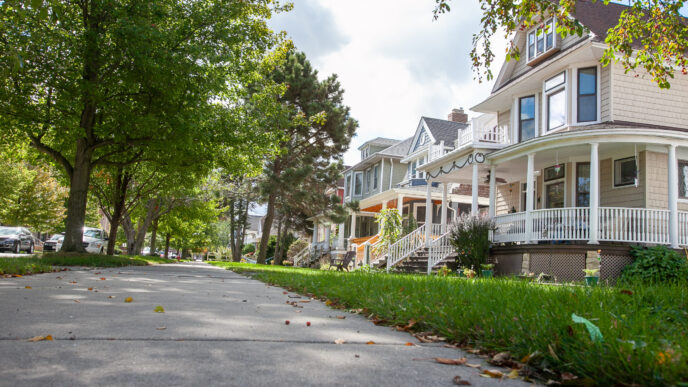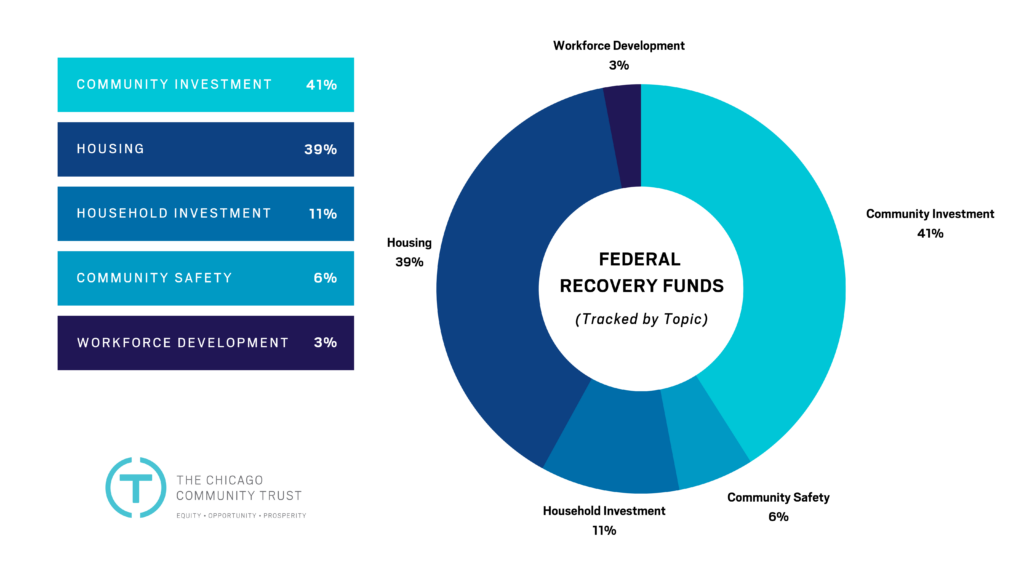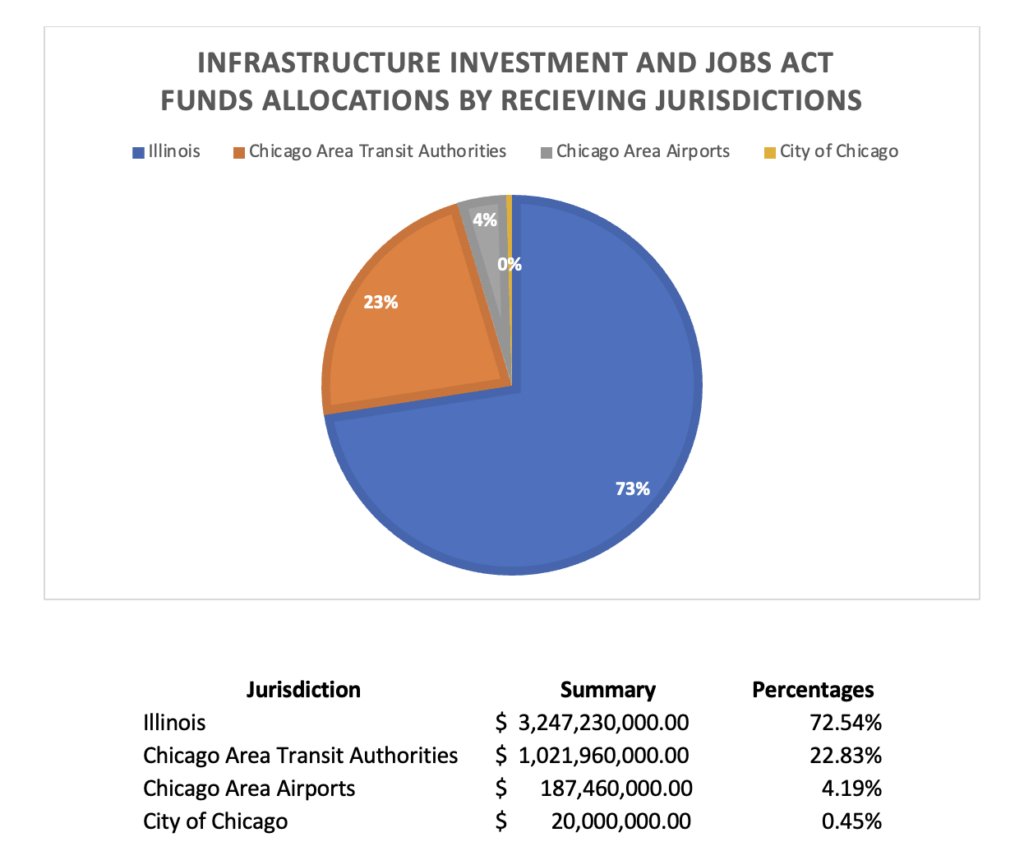
Federal Recovery Funds Dashboard
As part of its Equitable and Inclusive Economic Recovery strategy, the Trust partnered with Urban Institute to develop an online dashboard to provide a sightline into how the City of Chicago, Cook County, and the State of Illinois are spending unprecedented federal funding to address community investment, housing, workforce development, household investment, community safety, and infrastructure investment.
Launch the DashboardSummary
Congress appropriated trillions of dollars toward relief and recovery from COVID-19 and its economic impact. Several federal funding sources, including the Coronavirus Aid, Relief, and Economic Security (CARES) Act, American Rescue Plan Act (ARPA), and Infrastructure Investment and Jobs Act (IIJA), provided flexible resources and long-term opportunities for the City of Chicago, Cook County, and the State of Illinois to invest in their economic recovery. But the degree to which these investments lead to an equitable and inclusive economic recovery will require more than just dollars.
The Trust’s Equitable and Inclusive Economic Recovery strategy consists of a three-part approach to ensure federal funds reach communities that need them the most and that the lessons learned from COVID-19 relief and recovery lead to long-term systemic reform.
- Tracking Federal Funds: The Trust, in partnership with the Urban Institute, launched the Federal Recovery Funds Dashboard* to foster greater transparency and provide a comprehensive landscape of dollars appropriated toward the following purposes: Community Investment, Community Safety, Household Supports, Housing, Workforce, and Infrastructure Investment.
- Grant Making: Community-based organizations play a crucial role in ensuring federal funds reach the communities impacted by the pandemic the most. Applying for, deploying, or meeting compliance requirements of government grants can be challenging for smaller, less-resourced organizations. The Trust’s Open Call for Capacity Building for Government Grant and Procurement Opportunities provides grant support to help organizations overcome these challenges.
- Advocacy: Simply adding funds into an inequitable system will never lead to equitable outcomes. With the learnings gathered from tracking federal funds and supporting organizations to overcome challenges in the government grant-making process, the Trust will develop an advocacy strategy aimed at reforms to government procurement and a grant making processes to promote greater access among less-resourced organizations.
*The dashboard was developed with support from the Kresge Foundation through the Shared Prosperity Partnership.
What’s in the Dashboard
The dashboard now tracks two types of federal funds separately, economic recovery funds and Infrastructure Investment and Jobs Act Funds.
The economic recovery funds page tracks how $6.5 billion in federal recovery funds have been appropriated by topic areas tracked in the dashboard.
Note: The total amount tracked in the dashboard is $11.5 billion. Currently, the data for the remaining $5 billion in CARES Act funds is unavailable. As more information becomes available, the dashboard will be updated.

The new Infrastructure Funds page tracks about $4.5 Billion that have been allocated or awarded to the State of Illinois and Chicago region local jurisdictions for support infrastructure improvements for airports, roads, bridges, transit, water, and other major projects, and promote access and the infrastructure of electric vehicles.

Using the Dashboard
When navigating the dashboard, refer to the resources below:
Video Tutorial:
Why a Federal Recovery Funds Dashboard?
Video Tutorial:
Dashboard Walkthrough
Spending Snapshot
[As of September 29, 2022. Visit the dashboard for the latest data.]
- Community Investment: Although the City, County, and State may spend ARPA funds through the end of 2026, a significant amount of appropriated funds to support small businesses have already been spent, helping hundreds of entrepreneurs and business owners throughout the region recover lost revenue caused by the pandemic.
- Housing: Almost all housing assistance funds were appropriated directly from the federal government, primarily to provide emergency rental assistance. The City of Chicago, however, has appropriated some of its discretionary funds to support complementary housing assistance such as legal assistance and rapid rehousing services.
- Workforce Development: Comparatively, workforce development is the most underfunded topic, receiving only 3 percent of all tracked funds in the dashboard.
- Household Investment: Between the City of Chicago and Cook County, the region is piloting two historic guaranteed impact pilot programs, putting $53 million in unrestricted direct economic assistance in the hands of low-income households to help them meet needs.
- Community Safety: Although Congress did not appropriate funds specifically for community safety or violence prevention, the White House did encourage state and local governments to include this in their recovery plans and leverage their discretionary funds to support this work. Therefore, all federal funds allocated by the City, County, and State for community safety and violence prevention come from State and Local Fiscal Recovery Funds.
For Further Reading
-
Institute for Research on Race & Public Policy | UIC
Deadly Disparities in the Days of COVID-19: How Public Policy Fails Black and Latinx Chicagoans -
PolicyLink
Leveraging the American Rescue Plan Act to Advance Racial Equity -
United States Conference of Mayors | The Kresge Foundation
The American Rescue Plan Act: Promoting Equity Through ARPA Implementation (June 2022)
Questions?
For future updates on the dashboard, look below to sign up for our Trust Policy Brief newsletter or contact our team.